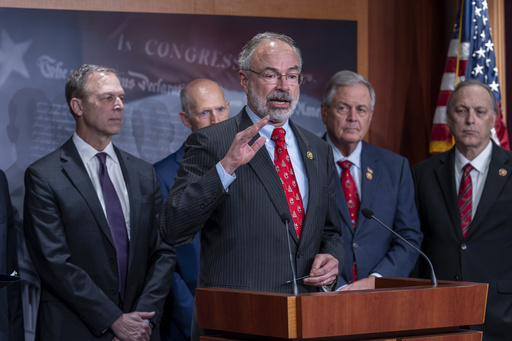
WASHINGTON — President-elect Donald Trump has dismissed a bipartisan proposal aimed at averting a potential government shutdown during the holiday season. He instructed House Speaker Mike Johnson and other Republican lawmakers to renegotiate the deal just two days prior to the funding deadline, creating a sense of urgency as Congress prepares to adjourn for the holidays.
The last-minute demands from Trump have led to confusion and intensified tensions among legislators striving to finalize their work before they can head home. With the clock ticking down to Friday’s deadline for government funding, Speaker Johnson finds himself in a challenging position to forge a new agreement.
In the meantime, a spokesperson for President Joe Biden has placed the blame for a potential shutdown squarely on Republicans. Press Secretary Karine Jean-Pierre urged GOP members to refrain from politicizing the bipartisan agreement, claiming that their actions could negatively affect hardworking Americans and destabilize various sectors of society. She accused Trump and Vice President-elect JD Vance of directing Republicans to facilitate a government closure, warning that such choices would be detrimental to communities striving to recover from recent disasters, as well as farmers, ranchers, and health centers.
As uncertainty looms over federal funding in the House, senators are cautiously awaiting the reactions and decisions within the party. Trump’s demand for the year-end spending package to also include an increase in the debt ceiling, meant to prevent a possible default, drew mixed responses from Republican senators. While some expressed understanding, others were skeptical about the feasibility of managing such a request in the midst of an impending funding expiration.
Senators like John Barrasso from Wyoming acknowledged Trump’s perspective but highlighted that negotiating a debt ceiling increase generally takes considerable time and could affect projects desperately needed by constituents. Meanwhile, some Republicans, including North Carolina Sen. Ted Budd, emphasized the urgency for immediate disaster relief funding amidst ongoing environmental challenges faced by their states.
Among these developments, Trump issued a stark warning to any Republican who might support passing a “clean continuing resolution” — a measure intended to extend government funding without significant changes. His statement suggested that such actions could lead to primary challenges against those legislators. Trump underscored that addressing the debt ceiling issue before his inauguration would avoid burdening his administration with the consequences stemming from it.
Meanwhile, public sentiment shows a notable overlap in perceptions of both Trump and tech billionaire Elon Musk. Surveys indicate that over 80% of Americans hold either a favorable or unfavorable view of both figures. This dynamic appears particularly pronounced among Republican voters, with a significant majority expressing positive views of both men.
As the specter of a government shutdown looms, frustration has arisen among several Republicans who initially anticipated the passage of a continuing resolution that would allow them to return home for the holidays. Instead, their plans were disrupted by Trump’s statements, causing significant delays in negotiations. Senior GOP appropriator Rep. Steve Womack expressed frustration over the situation, remarking on the ongoing unpredictability of congressional dealings.
Looking ahead, Trump remains resolute in pushing for a debt limit increase from Congress, despite the complexity of the task at hand. Previous negotiations had led to a suspension of the debt limit until January 2025, but internal party dissent ended up costing former House Speaker Kevin McCarthy his position.
The incoming administration’s perspective sees the current “Continuing Resolution” as flawed and impeded. Trump has publicly criticized the spending proposal as excessive, reiterating the need to address the debt ceiling before the current lawmakers exit their roles.
In the event that Congress fails to enact a continuing resolution or substitute spending measure by the impending Friday deadline, the federal government faces the risk of shutdown.
While Democrats firmly condemn Trump’s rejection of the spending bill, they emphasize that the responsibility for any subsequent hardship caused by a shutdown would rest squarely with Republicans. House Democratic Leader Hakeem Jeffries made it clear that any damage stemming from a government closure could be attributed to the GOP’s failure to uphold their commitments.
In summary, Trump’s intervention has significantly complicated the federal budget discussions, highlighting a fracture within the Republican Party as they contend with the consequences of his directives. The looming deadline for government funding, combined with Trump’s demands, has sown further discord and uncertainty just as lawmakers strive to finalize their business for the year.

